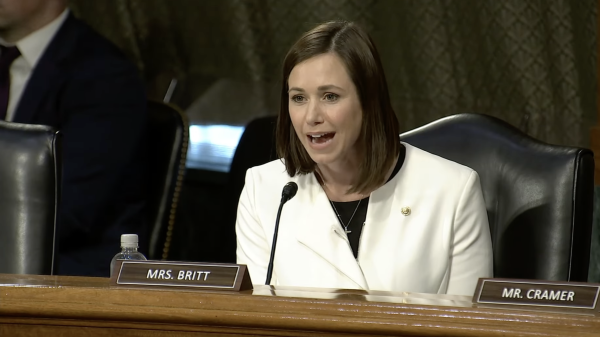The U.S. House of Representatives voted to pass HR4350, the National Defense Authorization Act for fiscal year 2022. The vote split the Alabama Congressional delegation with Reps. Mike Rogers, Jerry Carl and Terri Sewell voting in favor and Congressmen Mo Brooks, Robert Aderholt, Barry Moore and Gary Palmer voting “no.”
Congressman Mike Rogers, R-Alabama, was the lead Republican of the House Armed Services Committee.
“Without a doubt, our military is the greatest force for good the world has ever seen,” Rogers said. “Providing the authorities and resources our troops need to defend our nation and defeat our adversaries is the greatest responsibility we have here in Congress. We accomplish that responsibility with this NDAA. The FY22 NDAA ensures that our men and women in uniform have the funding they need to be ready for any conflict or battle our nation may face.”
Democrats have a narrow majority on the House Armed Services Committee, like the House as a whole.
“I thank my colleague Chairman Adam Smith for working with us to produce this bipartisan bill, and I’m glad to see its passage with overwhelming bipartisan support,” Rogers said.
Congressman Jerry Carl, R-Alabama, also issued a statement on the final passage of the House Fiscal Year 2022 National Defense Authorization Act (NDAA), which passed Thursday night.
“I’m proud to have played a role as a member of the House Armed Services Committee in passing a defense budget beneficial not only to south Alabama, but also to the United States’ overall defense interests,” Carl said. “Despite the weak budget proposed by President Biden, my colleagues on both sides of the aisle and I negotiated a necessary bipartisan increase in spending to counter threats and project U.S. strength around the world. Our number one objective is fully funding our military and giving our armed forces the tools they need to defend our nation, and this bill delivers on these priorities. Now, more than ever, I remain committed to supporting our armed forces and working to keep America safe.”
The House NDAA authorizes the building of two Expeditionary Fast Transport (EPF) vessels at Austal USA in Mobile, Alabama.
President Joe Biden’s budget request totaled $753 billion, whereas the House FY2022 NDAA totals $778 billion, an increase of nearly $25 billion.
U.S. Rep. Terri Sewell, D-Alabama, also voted to pass HR4350.
“One of my most solemn responsibilities as a Member of Congress is to ensure that our brave men and women in uniform have the resources they need to defend our nation from threats both foreign and domestic,” said Rep. Sewell. “I’m particularly proud that this year’s National Defense Authorization Act strengthens support for our troops with a nearly 3% pay raise, all while securing the U.S. against pressing national security threats from cyber-attacks, climate change, extremism, and our global competitors.”
Sewell’s office highlighted key points of the FY2022 NDAA:
- The bill authorizes support for a 2.7 percent pay increase for service members and increases the allowable parental leave for primary and secondary caregivers in military families. It makes child care more accessible for service members by expanding the in-home child care pilot program and providing financial assistance for in-home child care. The bill also makes historic changes to better combat sexual assault in the military, including removing the Commander from decisions related to the prosecution of sexual assault crimes and instead creating an Office of Special Victim Prosecutor to prosecute these crimes. In addition, it includes improvements in military health care, including making it easier to make mental health appointments.
- The bill strengthens the nation’s efforts to defend democratic values in the face of challenges from authoritarian states around the world and modernize our national security institutions and processes to reinvigorate our partnerships and alliances. For example, the bill includes an historic 36 percent increase in defense-wide basic and applied research and development, and significant increases in academic partnerships.
- The bill requires a plan for the creation of a Minority Institute for Defense Research and requires the head of each agency that awards contracts to the Department of Defense Federally Funded Research and Development Centers or to University Affiliated Research Centers to include a requirement to subcontract with Minority Institutions for at least 5 percent of the contract award to develop those Minority Institutions’ capacity to address the Defense Department’s research and development needs.
- The bill authorizes combatant commander initiative funds to be used for the purpose of enhancing extreme weather resilience of infrastructure. It also requires the Department of Defense to incorporate consideration of the risks of extreme weather into certain existing Department of Defense strategies and planning documents.
- The bill establishes an Office of Countering Extremism responsible for training and education about extremist activities; data collection and analysis; and countering extremism within the Department of Defense. It directs the Comptroller General of the United States to perform a review of the prevalence of extremist affiliations among members of the Armed Services and removes waiver authority to prevent enlistment of an individual who has been convicted of a felony hate crime. Finally, it directs the Secretary of Defense to provide a briefing on all studies regarding efforts of extremist organizations to recruit members of the armed forces; and a strategy to develop and implement training to prevent such recruitment efforts.
- The bill authorizes nearly $1 billion in additional cybersecurity investments in people, programs, and technologies. It requires the Secretary of Defense to create a software development and acquisition cadre to assist with developing and acquiring software by providing expert advice, assistance, and resources.
- The bill expresses the sense of Congress about the importance of the Afghan Special Immigrant Visas (SIV) program and honoring our commitments to those Afghan partners, who at great personal risk, supported the U.S. mission in Afghanistan. It authorizes $500 million for Department of Defense relocation support to SIVs and at-risk Afghans. Finally, it requires the Secretary of Defense to provide in-depth reports and briefings to Congress, providing critical information on the U.S. ability to counter terrorism in Afghanistan, accountability on the military equipment left in the country, and the plan to rescue American citizens and Afghan allies who remain in the country, ensuring transparency and ongoing oversight of the security situation in Afghanistan.
The NDAA passed in the House of Representatives today by a vote of 316 to 113.



















































